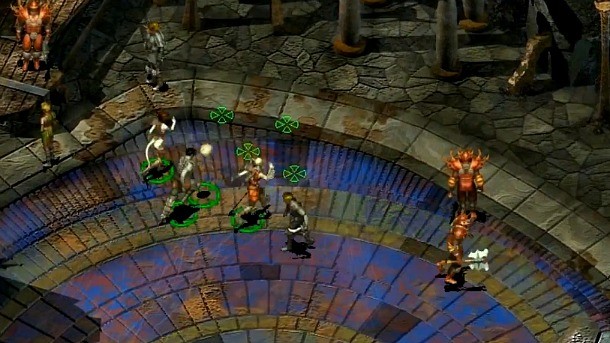Places – Sigil In Planescape: Torment

At an early age, I fell in love with the fantasy genre. My parents read Tolkien after dinner. My favorite babysitter taught me Dungeons & Dragons. My brothers and I turned our backyard into a dark forest. Fantasy worlds still enthrall my imagination. While any story can be thrilling, spectacular places invite me to return.
One fantasy world is less inviting than it is haunting: Sigil, the City of Doors. The city – originally a creation of the D&D universe – is the main setting for Planescape: Torment, a PC role-playing game developed by Black Isle Studios in late 1999. Sigil is not of this world. Everything from the twisted alleys to its melting pot of monsters and men calls to mind an uncomfortable reality. This strangeness attracted me to Sigil in the first place, but after playing through the game I realized it offered much more.
At the beginning of the game I am greeted by a floating skull. He shows me the ropes. Want work? Look for the zombie wearing a sign, he’s the notice board. Avoid the woman who is scared of doors. Try not to taunt things that look like monsters. In the evening, I help a pregnant alley divide (you read that right). On my way back I am jumped by thugs, and I wake up with full health on a mortuary slab.
Sigil is at its best when it leaves you scratching your head. For someone who had been raised on high fantasy, this was a welcome change. Gone is the predictable setting. The City of Doors is the crossroads of the cosmos, where every door and archway can become a gate to another world. Picture a city built around thousands of magical wardrobes and you begin to get the idea. Its denizens range from perverted skulls to talking alleyways. Refugees, monsters, and opportunistic merchants crowd the streets like a Casablanca for fantasy worlds.

David Zeb Cook created the planescape setting for Dungeons & Dragons in 1996.
This setting offers some strange encounters, but it is more than an excuse for unusual circumstances. Sigil becomes necessary to the plot, acting as a powerful agent in the narrative. Belief is the overarching theme of Planescape: Torment. Factions – groups with ideals taken to the extreme – divide the city. These factions aren’t warmongers, but philosophers. Belief is power for them. Sigil is constantly at war with itself, believing and disbelieving between the factions, never settling on one identity. For the player, the factions not only offer ideals to focus their belief, but also personify the conflict within the player.
Belief is the fundamental law of reality in Sigil. The walls of the city – and the denizens within – can be constructed and destroyed through will. Sigil is a city of the mind. How cool is that? When I am in Sigil, I feel like I am in someone else’s head. Creativity leaps out of every corner. Thought is power. A walk through Sigil is an existential experience. Video games rarely take this approach, and Sigil proves that they can move mountains when they do it right.
The Sigil players find in Planescape: Torment is a visualization of a D&D setting. Pulling the world across mediums from the D&D Planescape Campaign Setting to the video game must not have been easy. The developer could have drifted away from the established setting – a setting that was already loved. Instead they enabled Sigil, and gave us an eye and an ear into a spectacular City of Doors.
A community has grown around Planescape: Torment since its initial release. With everyone sharing a great fondness for Sigil, it should be no surprise that the community wants to keep Sigil alive. Mods continue to improve the quality of the original game, and mods in other games like Neverwinter Nights 2 offer fans of Sigil a detailed recreation of the city. Beyond the amazing work of the mod community, I would not want to see an iteration of Sigil in another video game. It’s one thing for a community to write a love letter to a game that they love. It is another for a company to go back to Sigil for profit. Any further visit would likely take away from the original experience.
However, Planescape: Torment is having a spiritual successor. Torment: Tides of Numenera is being developed by some of the same people who worked at Black Isle Studios. The new game doesn’t take place in Sigil, nor in the same universe, but it maintains the tone that brought Sigil to life. I’ll wait and see if Numenera takes on a life of its own. In the meantime, I can be content with Sigil’s inspired setting.

Get the Game Informer Print Edition!
Explore your favorite games in premium print format, delivered to your door.
- 10 issues per year
- Only $4.80 per issue
- Full digital magazine archive access
- Since 1991









